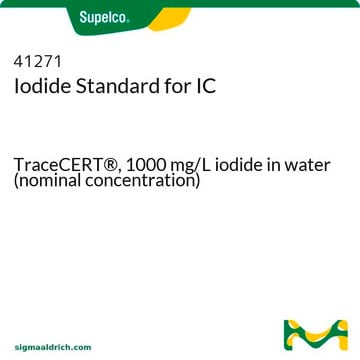PHR1360
Potassium Iodide
Pharmaceutical Secondary Standard; Certified Reference Material
Synonym(s):
Potassium iodide
About This Item
Recommended Products
grade
certified reference material
pharmaceutical secondary standard
Quality Level
Agency
traceable to USP 1548280
vapor pressure
1 mmHg ( 745 °C)
API family
potassium iodide
CofA
current certificate can be downloaded
packaging
pkg of 5 g
technique(s)
HPLC: suitable
gas chromatography (GC): suitable
mp
681 °C (lit.)
application(s)
pharmaceutical (small molecule)
format
neat
storage temp.
2-30°C
SMILES string
[K+].[I-]
InChI
1S/HI.K/h1H;/q;+1/p-1
InChI key
NLKNQRATVPKPDG-UHFFFAOYSA-M
Looking for similar products? Visit Product Comparison Guide
General description
Pharmaceutical secondary standards for application in quality control, provide pharma laboratories and manufacturers with a convenient and cost-effective alternative to the preparation of in-house working standards.
Application
Footnote
related product
Signal Word
Danger
Hazard Statements
Precautionary Statements
Hazard Classifications
STOT RE 1 Oral
Target Organs
Thyroid
Storage Class Code
6.1D - Non-combustible acute toxic Cat.3 / toxic hazardous materials or hazardous materials causing chronic effects
WGK
WGK 3
Flash Point(F)
Not applicable
Flash Point(C)
Not applicable
Choose from one of the most recent versions:
Already Own This Product?
Find documentation for the products that you have recently purchased in the Document Library.
Customers Also Viewed
Our team of scientists has experience in all areas of research including Life Science, Material Science, Chemical Synthesis, Chromatography, Analytical and many others.
Contact Technical Service





